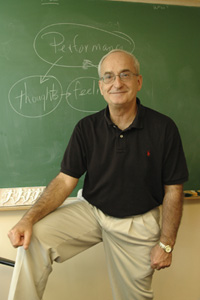 |
|
||
|
|||
Sports psychology unit to focus college athletes in class and on the field
By Brian Fitzgerald
|
|
|
|
Len Zaichkowsky Photo by Fred Sway |
|
Sports psychologist Leonard Zaichkowsky once joked to a faculty member that the BU hockey team had two head coaches. “Jack Parker may be the head coach, but I’m the head coach,” he said, pointing to his own noggin.
Sports psychology is usually associated with professional athletes, who commonly seek the advice of such gurus. Mental demons, however, also stalk college athletes, and more and more schools are using sports psychologists to improve their players’ performances.
BU recently created the Sports Psychology Services Unit — a combined effort of Zaichkowsky, an SED and MED professor of counseling, the athletic department’s student athlete support services and its training staff, and the BU sports medicine program, which is a collaboration between the School of Medicine and Sargent College.
“This unit will assist all of our teams and coaches as they deal with the increasing challenges of handling issues ranging from stress and time management to more serious challenges like depression and anxiety,” says Mike Lynch, director of athletics.
Student-athletes are especially vulnerable to stress because they have to balance not only academics and their social lives, but also a demanding training regimen during a long season that involves extensive travel. Hockey players, for example, play 35 games, not including playoffs, in a season that begins in October and extends into April. Parker (SMG’68, Hon.’97) has said that the season is “way too long” and the players “never get a chance to be regular students.”
Zaichkowsky, one of the first sports psychologists affiliated with a college hockey team, says the pressures on student-athletes, especially on those who have already been drafted by professional teams, is enormous. “Take freshman athletes coming in whose goal is to impress the coach and become first-stringers,” he says. “For the first time in their lives they are playing against athletes of comparable ability, and academically they’re being pushed like they’ve never been pushed before. They’re trying to get some kind of balance in their lives, and they need to talk to someone besides the coach — a neutral party. The coaches are kind of buried in the x’s and o’s, and don’t really have time to handle these issues. If a student is not performing at his or her best in the classroom and on the field, that’s where we come in.”
The unit “is a win-win situation for both BU athletics and the graduate training program at the University,” says Zaichkowsky, who heads the sport and exercise psychology specialization, a collaborative graduate training program in mental health and behavioral medicine offered by SED and MED. “In my opinion we have the best training programs in the country, if not the world.”
The unit’s sports psychologists and sports psychology graduate students will work closely with student-athletes on issues such as anxiety, stress, performance enhancement, depression, and other related areas. Maria Hutsick, director of sports medicine, and Karen Plescia, coordinator of student-athlete support services, will comanage the referral process and the coordination of the unit. In addition, team physicians on the sports medicine staff will evaluate and determine the care of athletes who have more serious medical or mental health issues.
Zaichkowsky, who is from a small town in western Canada, received a bachelor’s degree in physical education from the University of Alberta, a master’s degree in education from the University of Oklahoma, and his Ph.D. in sports psychology from the University of Toledo. In 1975, two years after he came to BU, he met Rick Pitino, then the Terrier basketball coach. The two reconnected in 1997, when Pitino took over as coach of the Boston Celtics and asked him to test potential recruits “primarily for their mental toughness.” He also worked with Pitino’s successor, Jim O’Brien.
Zaichkowsky says the services that sports psychologists offer to coaches and athletes run the gamut. “Sometimes it’s as simple as teaching a person how to relax,” he says. “If a basketball player is throwing up bricks, sometimes it’s because he’s tense, and his muscles tighten up. No one has ever taught him how to relax, so I have him do breathing exercises. But inevitably, you see people who have more clinical issues — an eating disorder or a case of extreme anxiety.”
The Sports Psychology Services Unit “is formalizing the relationship between these different support services for student-athletes,” says Zaichkowsky. “When I first came to BU it was a lot less formal. I’d get a call from a coach who’d say, ‘Len, we’ve got a real fire we’ve got to put out,’ and I’d go over and work with him and the player. Now the services are more comprehensive.” The unit includes sports psychologists Amy Baltzell (SED’96,’99), an SED clinical assistant professor, and Jim Howland (SSW’91, SED’07).
Fortunately, Zaichkowsky says, most of the student-athlete cases he sees “are ordinary adjustment problems — the kind most of us experienced when we went to college. There’s no hocus-pocus involved. We’re there to help them cope. It’s a strength and conditioning coach’s job to get a player prepared physically, and it’s our job to get them tougher mentally.”
![]()
22
October 2004
Boston University
Office of University Relations
